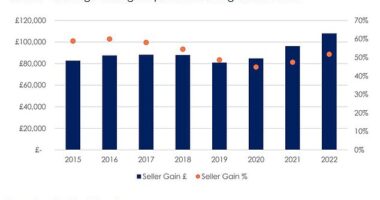
Homeowners could save thousands of pounds by using a little-known mortgage trick.
And the timing couldn’t be better as borrowers brace for the Bank of England to hike interest rates to a 13-year high tomorrow.
Around 1.5 million fixed-rate home loans are set to expire this year, according to banking trade body UK Finance.


Mortgage renewals: Around 1.5 million fixed-rate home loans are set to expire this year, according to banking trade body UK Finance
With interest rates rising, borrowers face a hefty jump in their monthly repayments. Yet there is a way to mitigate this extra expense – you just have to act quickly.
Many borrowers do not realise that lenders often allow you to lock into a new rate up to six months before your current deal ends.
They instead wait until their existing loan has run its course before signing up to a new offer.
But with top rates now disappearing almost daily and interest rates set to soar, this could be a costly mistake.
In fact, Money Mail figures show that reserving a new rate early could save the average homeowner nearly £500 a year — more than £2,000 over the course of a typical five-year fixed deal.
A fixed deal allows borrowers to lock in their rate for a period of two, three, five or even ten years. When it ends, they must pick a new deal to avoid paying their lender’s ‘standard variable rate’, which is usually vastly more expensive.
If you switch before the end of your term it usually triggers a hefty penalty known as an early repayment charge.
But most lenders offer a loophole that allows borrowers to apply for a new deal up to six months before their term expires — which could prove invaluable in the current market.
David Hollingworth, of broker London & Country, says: ‘With rates rising, you could bag a rate that simply won’t be available in one month’s time, let alone six.’
The Bank of England has now hiked the base rate four times since December, from a record low of 0.1 per cent to 1 per cent last month.
Tomorrow could bring fresh pain with rates expected to leap to 1.25 per cent, possibly higher.
Experts also predict interest rates could hit 2 per cent before the end of the year as the Bank battles to keep a lid on spiralling inflation.
As a result, cheap mortgage deals are fast disappearing. All sub-1 per cent deals have vanished since last year.


Many borrowers do not realise that lenders often allow you to lock into a new rate up to six months before your current deal ends
The average two-year fixed-rate deal has now breached 3 per cent for the first time in over seven years, according to data analysts Moneyfacts.
And a typical five-year mortgage nudged up by 0.16 percentage points in just one month from April to May.
Analysis by Money Mail shows the average household could save £475 in one year alone by agreeing a new mortgage deal in advance — a £2,375 saving over five years. This is based on a typical outstanding home loan of £161,774.
If the average five-year fixed rate rises by a further 0.5 percentage points by the end of 2022, borrowers would pay 3.67 per cent compared with 3.17 per cent now.
With the loan size above, this would cost homeowners on a five-year deal an extra £39.59 a month — or £475 a year.
While many homeowners may prefer to fix rates for longer terms, experts are wary of recommending ten-year fixed deals.
Jonathan Harris, managing director of broker Forensic Property Finance, says: ‘There’s been increased interest in ten-year fixes because they are so competitively priced. But once people realise the early repayment charges involved, they often change their mind.’
Anyone who has suffered financial setbacks may find it easier to apply for a product transfer with their existing lender.
These are usually available up to three months before your deal ends and can be quicker to arrange as the bank already knows your details.
Mr Harris says: ‘While you can arrange a product transfer without proof of income, you can’t remortgage without it — which is why the former works better for some.’
For some borrowers, who are perhaps looking to move house soon, a flexible, variable-rate deal may still work out best as there are no early-exit fees.
Rosie Fish, of online mortgage company Habito, says: ‘If you have six months or less left on your current deal, now is the time to get ahead of any further rate rises.
The cheapest deals on the market are being withdrawn at short notice, so make sure your documents are in order to help avoid delays when it’s time to submit your application.’
A mortgage broker can help you find the right deal at the right time, as well as access offers not available to homeowners direct.
London & Country, Habito, and Trussle are all fee-free. Website unbiased.co.uk can also connect you with brokers in your area.










